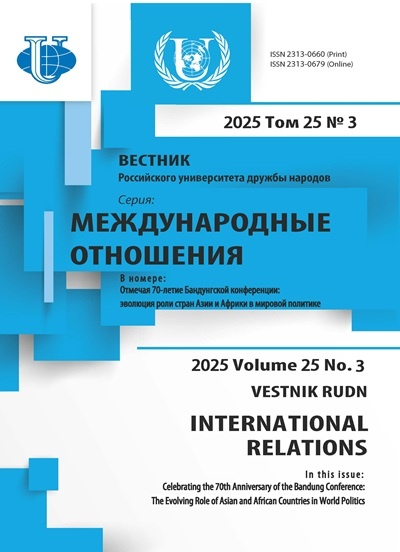Помощь стран Персидского залива постреволюционному Египту: логика, динамика, системное влияние
- Авторы: Бартенев В.И.1
-
Учреждения:
- Московский государственный университет им. М.В. Ломоносова
- Выпуск: Том 19, № 4 (2019): Исламский фактор в мировой политике
- Страницы: 566-582
- Раздел: ТЕМАТИЧЕСКОЕ ДОСЬЕ
- URL: https://journals.rudn.ru/international-relations/article/view/22836
- DOI: https://doi.org/10.22363/2313-0660-2019-19-4-566-582
- ID: 22836
Цитировать
Полный текст
Аннотация
Исследователям, отслеживающим изменения в глобальной архитектуре международной помощи, 2010-е гг. запомнятся резким укреплением позиций стран Персидского залива (Саудовской Аравии, ОАЭ, Кувейта и Катара), произошедшим на фоне «Арабского пробуждения». Наибольшие объемы помощи эти государства предоставляли Египту, чье политическое развитие - в том числе под влиянием исламского фактора - пошло по особенно извилистому пути. В статье исследованы логика, динамика и роль поддержки стран - членов ССАГПЗ в этом процессе, начиная с 2011 г. до текущего момента. В структурном плане статья состоит из четырех частей, каждая из которых соответствует определенному этапу постреволюционной истории Египта и содержит анализ логики и взаимовлияния донорских инициатив стран Персидского залива и их воздействия на внутреннюю и внешнюю политику египетских властей и поведение внерегиональных акторов. Сделан вывод о том, что на всех четырех этапах донорская активность стран ССАГПЗ играла в турбулентном развитии Египта центральную роль. При этом, вопреки расхожему тезису о преобладании в политике арабских доноров мотивов культурной и религиозной солидарности, они настолько же искусно использовали помощь в качестве инструмента обеспечения политических и экономических интересов, как и «традиционные» доноры, корректируя ее структуру, исходя из изменений «на земле» и экономической конъюнктуры. Усиление роли монархий Залива в судьбе Египта стало следствием не только роста их собственных амбиций и возможностей, но и чрезмерной осторожности стран Запада, на фоне которых арабские доноры, не требовавшие от египетских властей повышения качества государственного управления и действовавшие решительно и оперативно, выглядели как более надежные партнеры. Их усиление, в свою очередь, заставляло западные государства закрывать глаза на те или иные дефекты политической системы или экономики Египта, дабы не потерять свое влияние окончательно. Такое взаимовлияние поведения западных и незападных доноров обозначает тенденцию, которая заслуживает подробного изучения на более широкой выборке страновых кейсов.
Ключевые слова
Об авторах
Владимир Игоревич Бартенев
Московский государственный университет им. М.В. Ломоносова
Автор, ответственный за переписку.
Email: vladimir.bartenev@fmp.msu.ru
кандидат исторических наук, доцент кафедры международных организаций и мировых политических процессов, директор Центра проблем безопасности и развития факультета мировой политики
Москва, Российская ФедерацияСписок литературы
- Бартенев В.И. Помощь «хрупким государствам» сквозь призму риск-менеджмента: лабиринт объяснительных гипотез // Международные процессы. 2018. Т. 16. № 4 (55). С. 20-41. doi: 10.17994/IT.2018.16.4.55.2
- Коротаев А.В., Исаев Л.М. Анатомия египетской контрреволюции // Мировая экономика и международные отношения. 2014. № 8. С. 91-100.
- Косач Г.Г. Морские шахматы Египта и Саудовской Аравии // Российский совет по международным делам. 20.06.2017. URL: https://russiancouncil.ru/analytics-and-comments/analytics/morskie-shakhmaty-egipta-i-saudovskoy-aravii/ (дата обращения: 01.12.2019).
- Косач Г.Г. Эволюция внешней политики Саудовской Аравии после «арабской весны» // Вестник Нижегородского университета им. Н.И. Лобачевского. 2015. № 3. С. 50-62.
- Кузнецов В.А., Оганисян Л.Д. Дилеммы демократизации: политика Евросоюза в Тунисе и Египте после Арабского пробуждения // Современная Европа. 2018. № 5. С. 25-36. doi: 10.15211/soveurope520182536
- Мелкумян Е.С. Гуманитарная политика арабских монархий Персидского залива // Пути к миру и безопасности. 2018. № 1 (54). C. 299-307. doi: 10.20542/2307-1494-2018-1-299-307
- Almezaini K. Implementing Global Strategy in the UAE Foreign Aid: from Arab Solidarity to South-South Cooperation // Вестник Российского университета дружбы народов. Серия: Международные отношения. 2018. Т. 18. № 3. С. 579-594. doi: 10.22363/2313-0660-2018-18-3-579-594
- Amin K. International Assistance to Egypt after the 2011 and 2013 Uprisings: More Politics and Less Development // Mediterranean Politics. 2014. Vol. 19. No. 3. P. 392-412. doi: 10.1080/13629395.2014.966989
- Azaola Piazza B. The Foreign Policy of Post-Mubarak Egypt and the Strengthening of Relations with Saudi Arabia: Balancing Between Economic Vulnerability and Regional and Regime Security // The Journal of North African Studies. 2019. Vol. 24. P. 401-425. doi: 10.1080/13629387.2018.1454650
- Farouk Y. More than Money: Post-Mubarak Egypt, Saudi Arabia, and the Gulf. Gulf Research Center. Gulf Paper. April, 2014. URL: https://www.files.ethz.ch/isn/179860/Egypt_Money_new_29-4-14_2576.pdf (accessed: 01.11.2019)
- Hecan M. Comparative Political Economy of the IMF Arrangements after the Arab Uprisings: Egypt and Tunisia // The Journal of North African Studies. 2016. Vol. 21. No. 5. P. 765-793. doi: 10.1080/13629387.2016.1195268
- Sailer M. Changed Priorities in the Gulf. Saudi Arabia and the Emirates Rethink Their Relationship with Egypt. SWP Comment. January 8, 2016. URL: https://www.swp-berlin.org/fileadmin/contents/products/comments/2016C08_sil.pdf (accessed: 01.11.2019)
- Sons S., Wiese I. The Engagement of Arab Gulf States in Egypt and Tunisia since 2011: Rationale and Impact. DGAPanalyse. No. 9. 2015. URL: https://dgap.org/system/files/article_pdfs/2015-09g.pdf (accessed: 01.11.2019)
- Talbot V. The Gulf Monarchies in a Changing MENA Region. ISPI 139. October 2012. URL: https://www.iemed.org/ observatori-en/arees-danalisi/arxius-adjunts/anuari/med.2011/Talbot_en.pdf (accessed: 01.11.2019)
- Talbot V. The Gulf States’ Political and Economic Role in the Mediterranean. ISPI. Med. 2011. Dossier. P. 101-104. URL: https://www.iemed.org/observatori-en/arees-danalisi/arxius-adjunts/anuari/med.2011/Talbot_en.pdf (accessed: 01.11.2019)
- The Struggle for Influence in the Middle East. The Arab Uprisings and Foreign Assistance / Ed. by F. Bicchi, B. Chailland, S. Heydemann. Miltin Park, Abingdon and NY: Routledge, 2016
- Ulrichsen K.C. GCC Foreign Policy: Struggle for Consensus // Routledge Handbook of International Relations in the Middle East / Ed. by S. Akbarzadeh. Milton Park, Abingdon, Oxon; New York, NY: Routledge, 2019
- Young K.E. A New Politics of GCC Economic Statecraft: The Case of UAE Aid and Financial Intervention in Egypt // Journal of Arabian Studies. 2017. Vol. 7. No. 1. P. 113-136. doi: 10.1080/21534764.2017.1316051
Дополнительные файлы










